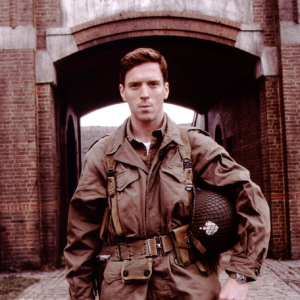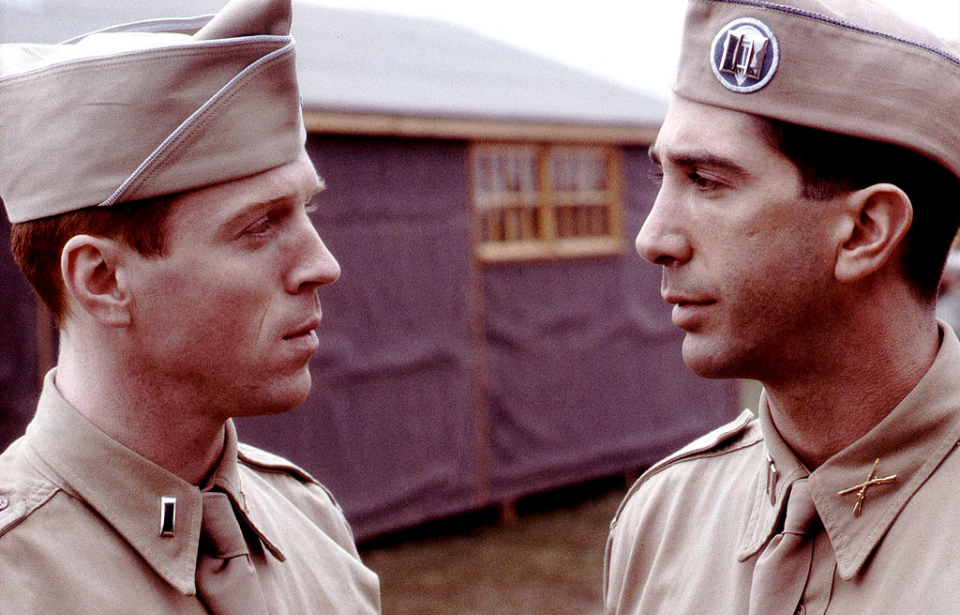
HBO’s 2001 miniseries, Band of Brothers, has continued to gain popularity in the decades since its release. This is partly due to later generations having greater access to the series – in particular, via the internet and streaming services. The show was based upon the best-selling book of the same name by Stephen Ambrose, who used the opportunity to focus on a specific aspect of the 101st Airborne Division’s 506th Parachute Infantry Regiment. Here are some facts about East Company, 2nd Battalion.
Ronald Speirs
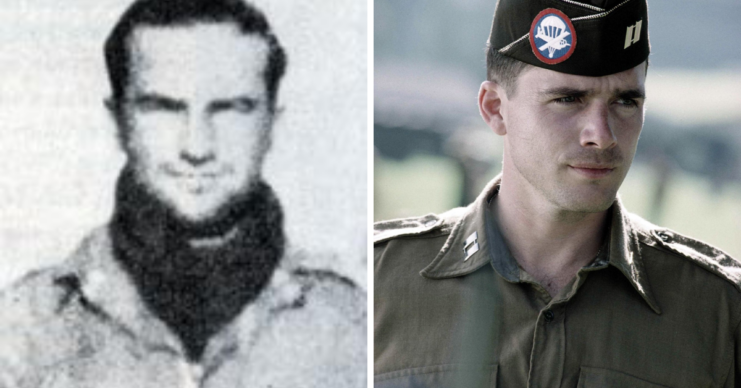
Ronald Speirs + Matthew Settle as Ronald Speirs in Band of Brothers, 2001. (Photo Credit: 1. US Army / Wikimedia Commons / Public Domain 2. jeffw616 / HBO / Dreamworks Pictures / MovieStillsDB)
Ronald Speirs retired from the US military after a career that spanned the better part of three decades. He began pursuing his dream to serve his country in high school by attending military training, which eventually led to him being commissioned as a second lieutenant in the US Army. He followed this up by volunteering to become a paratrooper.
Prior to serving with Easy Company, he was a platoon leader with B Company, 1st Battalion, 506th Parachute Infantry Regiment, before being reassigned to 2nd Platoon, Dog Company, 2nd Battalion, with whom he was shipped to England to begin training for D-Day.
As a result of Band of Brothers and Stephen Ambrose’s book, the majority of people know he played a part in the famous attack on Brécourt Manor on June 6, 1944, which took out German howitzers that had been firing relentlessly on nearby Utah Beach. Teaming up with Easy Company, which had fallen under the command of 1st Lt. Richard Winters, the outnumbered Americans defeated the enemy.
At some point after D-Day, Speirs was transferred to Easy Company, with whom he fought in Operation Market Garden. One of the missions he undertook during this otherwise disastrous time period earned him the Silver Star. After leading a patrol along the Nederrijn, he swam across the water to scout out enemy positions. This allowed other units to conduct similar reconnaissance missions.
Spiers then participated in the Battle of the Bulge. A little-known fact is that Speirs became Easy Company’s commander during the attack on Foy, which occurred as part of the engagement. It’s a good thing, too, because he replaced a rather inept leader, 1st Lt. Norman Dike.
For those who watched Band of Brothers, but never read the book, Speirs did, indeed, run through enemy fire to coordinate the assault. He also came back the same way: under fire. However, whether he did, in fact, kill a group of German prisoners of war (POWs), as the series suggests, remains subject to speculation.
Speirs remained in the US Army following the Second World War, and was one of only a handful of men to have made combat jumps in both the conflict and Korea. In 1951, he dropped behind a line of retreating North Korean troops in Munsan-ni, as part of Operation Tomahawk. As the commander of a rifle company with the 187th Airborne Regimental Combat Team, he and his men killed between 40-50 enemy combatants.
One “claim to fame” (and little-known fact) is that the Easy Company veteran served as a liaison officer to the Soviet Army during the mid-1950s. He was also the American governor of Spandau prison. The facility housed the former deputy Führer, who’d been imprisoned there on war crimes.
The commandant of Spandau was a rotating position. Each of the major powers took a turn. In 1958, the decision was made to put Speirs in the role. He’d had to learn Russian following the Korean War, and this was seen as a great advantage to the post.
After the assignment, Speirs served as a US military liaison to the Royal Lao Army, just prior to the American involvement in Southeast Asia growing into the Vietnam War. He retired from service in 1964 as a lieutenant colonel, with his final role having been as a plans officer for the US Department of Defense.
Speirs passed away on April 11, 2007, at the age of 86.
Albert Blithe
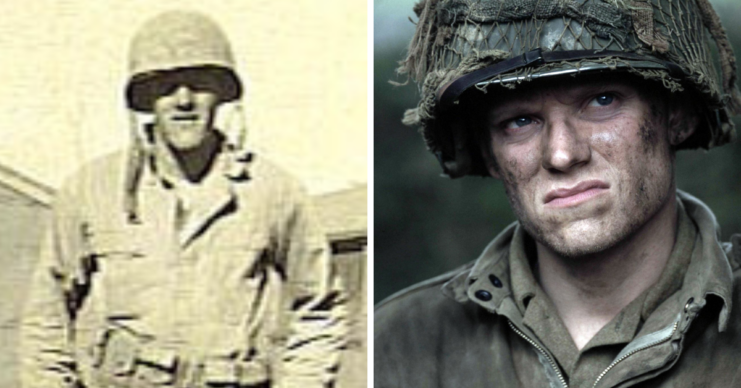
Albert Blithe, 1942 + Marc Warren as Albert Blithe in Band of Brothers, 2001. (Photo Credit: 1. US Army / Wikimedia Commons / Public Domain 2. mdew / HBO / Dreamworks Pictures / MovieStillsDB)
It’s a little-known fact that Albert Blithe is only mentioned in Stephen Ambrose’s book on three pages: the famous incident in which he lost his eyesight, as well as his taking point during one of Easy Company’s patrols in Normandy. That being said, he definitely had an interesting time in Europe, despite it being a rather short deployment.
Blithe opted to serve as a paratrooper, rather than complete high school. He participated in training at Camp Toccoa, Georgia, after which he was sent to England and, later, jumped into France as part of the D-Day landings. Unfortunately, he and many others had been dropped in the wrong location, and he found himself lost for a time.
Shortly after landing in Normandy, Easy Company took the town of Carentan. While the five-day battle ended in an American victory, the fighting was enough to give him a case of “hysterical blindness.” Luckily, he recovered after only a few days, after which he was sent on a patrol.
During this patrol, Blithe was shot in the collarbone by a German sniper. While this is mentioned in Band of Brothers, the show’s portrayal of what happened next shows a lack of research on the producers’ part. In fact, the episode, titled “Carentan” got the Easy Company veteran’s fate completely wrong! It ends with the audience learning Blithe never recovered from the wound and died in 1948. However, he did survive.
Another matter the producers got wrong about Blithe is that he didn’t have a Southern accent. He was from Philadelphia, just like Edward “Babe” Heffron and William Guarnere.
Blithe spent the remainder of World War II Stateside, recovering from the wound. Following his discharge, he pursued a brief civilian career at Westinghouse Electric, before re-enlisting to serve in Korea. He was deployed overseas with the 187th Airborne Regimental Combat Team, with whom he received the Bronze and Silver Star, after which he was assigned to the Military Assistance Advisory Group (MAAG) in Taiwan.
While on active duty in Germany in December 1967, Blithe complained on nausea. He was taken to hospital, where he was diagnosed with a perforated ulcer. He died not long after, and was buried at Arlington National Cemetery with full honors.
Edward ‘Babe’ Heffron
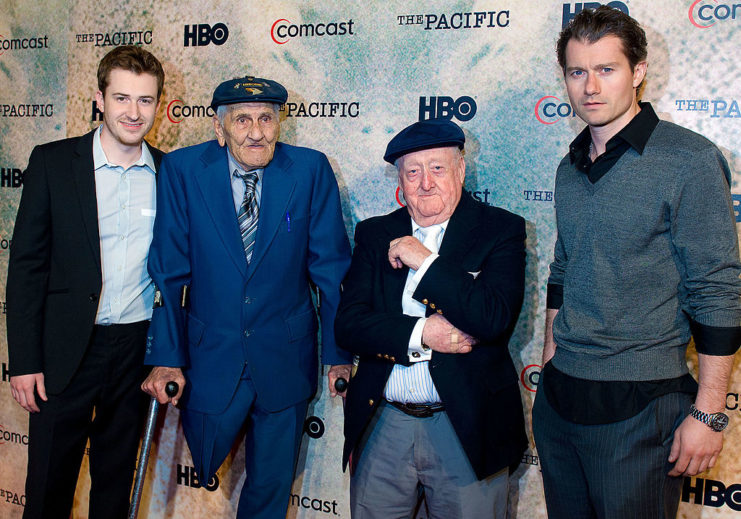
Joe Mazzello, William “Wild Bill” Guarnere, Edward “Babe” Heffron and James Badge Dale at a special screening of The Pacific, 2010. (Photo Credit: Jeff Fusco / Getty Images)
Edward “Babe” Heffron and William “Wild Bill” Guarnere were from Philadelphia, Pennsylvania. The two became fast friends. Following the release of Band of Brothers, they were often seen together, leading tours of the famous battle sites featured in the series. They also appeared as guest speakers at military gatherings, and even wrote a book about their experiences during WWII.
Heffron was working at New York Shipbuilding when he decided to enlist in the newly-formed airborne forces. He subsequently became a member of Easy Company, despite the fact he had a medical condition that locked up his hands and fingers. As with many of his fellow paratroopers, he participated in Operation Overlord, the Battle of the Bulge and Operation Market Garden. He also helped seize the Eagle’s Nest and was part of the liberation of Kaufering concentration camp.
It was during the Battle of the Bulge that Heffron risked his life for a fellow soldier. On New Year’s Day 1945, he was manning his machine gun in a foxhole when someone called out that his friend, John T. Julian, had been hit by enemy fire. While he attempted to retrieve his friend’s body, relentless German action prevented him from doing so. Thankfully, Julian’s squad was able to bring him back.
In Band of Brothers, Heffron was portrayed by Scottish actor, Robin Laing, who was acclaimed for his portrayal of the Easy Company veteran (a rather fun fact). The real-life Heffron can also be seen in the series. He has a cameo as an older Dutchman drinking wine and waving a small flag during the liberation of Eindhoven by US and British troops.
Following the Second World War, Heffron returned to civilian life, working for Publicker Industries, after which he worked on Philadelphia’s waterfront. He passed away on December 1, 2013, at the age of 90. Two years later, a statue of the Easy Company veteran was unveiled in South Philadelphia, where he used to live.
Herbert Sobel
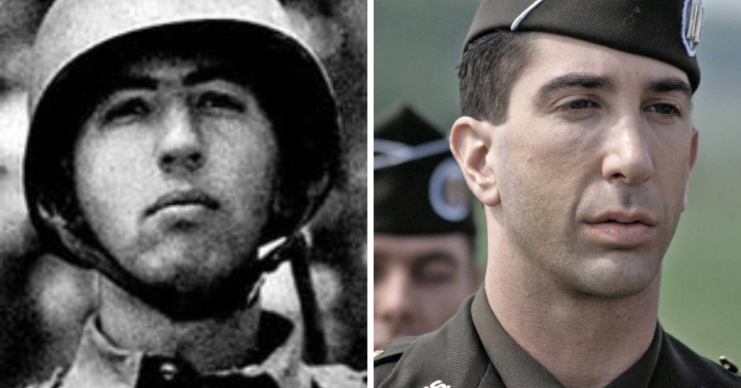
Herbert Sobel + David Schwimmer as Herbert Sobel in Band of Brothers, 2001. (Photo Credit: 1. US Army / Wikimedia Commons / Public Domain 2. mdew / HBO / Dreamworks Pictures / MovieStillsDB)
Herbert Sobel was portrayed by Friends (1994-2004) star, David Schwimmer, in Band of Brothers. A fun fact about this is that the majority of those who’d served with Easy Company agreed that the actor nailed his portrayal of the veteran.
Sobel volunteered to serve as a paratrooper in the US Army in March 1941, and was commissioned as a second lieutenant. He was quickly promoted to first lieutenant and put in charge of training Easy Company at Camp Toccoa. He was so effective in this role that he received yet another promotion, this time to the rank of captain.
Sobel was thoroughly hated by those with whom he served in Easy Company – and they had reason to feel this way. The part in Band of Brothers about the spaghetti was true. He waited until the men had chowed down on immense quantities of pasta before ordering them to climb Mount Currahee. Just like in the series, they puked their guts out. On top of this, Sobel actually yelled, “Hi-yo Silver!” He also revoked passes, fined men, and pitted them against one another and other companies.
Despite all that, many of the men credit Sobel’s training regimen with keeping them alive during their first days in combat; in fact, Easy Company’s recruits were so physically fit that they were allowed to skip the physical training portion of Jump School. While they referred to Sobel as “Him,” due to their dislike of saying his name, they gave him credit for toughening them up.
Sobel wasn’t a combat officer. He couldn’t navigate and his men hated him, making a real possibility of an “accident” on the front. He was assigned to a training battalion and then became a supply officer. After WWII, he settled down and started a family. He was also briefly recalled for service during the Korean War.
However, Sobel couldn’t seem to shake what he saw as the disgrace of being kept from combat; he had to tell people that he’d served with the famed 101st Airborne Division, but had never seen combat. In 1970, he attempted to take his own life. While he failed, he did lose his sight as a result.
Sobel was subsequently sent to a VA facility in Illinois, where he lived out the rest of his days until he died from malnutrition in 1987. He was given no funeral.
‘Why We Fight’
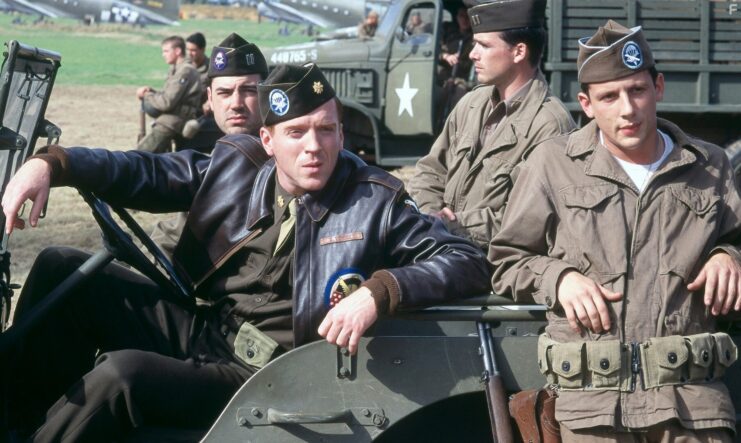
Band of Brothers, 2001. (Photo Credit: jeffw616 / HBO / Dreamworks Pictures / MovieStillsDB)
“Why We Fight” is the title of the ninth episode of Band of Brothers. Much of it concerns the liberation of a small concentration camp that the men of the 506th Parachute Infantry Regiment discovery while on patrol in Germany. Entering the site, they find the SS has abandoned the site, killing many of the prisoners. Those who remain are starving and ill.
Richard Winters, portrayed by Damian Lewis, orders that medical care, food and water are given to the inmates. However, with the arrival of the battalion commander and medical staff, the men of Easy Company have to return the prisoners to the camp, so they didn’t wander and spread disease. It’s also so they can receive proper care. Later in the episode, German civilians are forced to bury the victims, so they can see with their own eyes the true nature of the Führer‘s regime.
There is one major problem with this, and it’s an important fact to note: Easy Company never liberated a concentration camp. This is stated by Donald Malarkey in his autobiography, Easy Company Soldier: The Legendary Battles of a Sergeant from World War II’s “Band of Brothers”.
The reason for why this extra scene was included was because the producers wanted to convey the horror of the war in Europe, not just Easy Company’s experiences. To do this, they incorporated experiences from other units, especially scenes involving the liberation of camps, in an attempt to convey to the audience the real horrors soldiers and civilians encountered almost daily.
